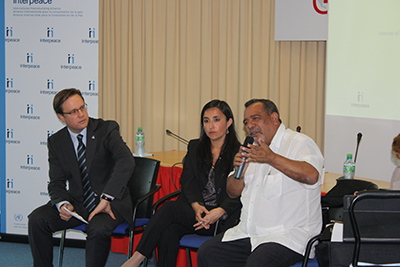Interpeace hosts practice briefing on gang truce in El Salvador

Earlier this month, Interpeace and the Geneva Peacebuilding Platform organized a practice briefing on the gang truce in El Salvador. The event, moderated by Interpeace Director-General Scott M. Weber, included insights from Isabel Aguilar Umaña, Director of Interpeace's Central America Youth Programme, and Raúl Mijango, a truce facilitator from El Salvador.
Scott began the discussion by highlighting the dangers that Central America faces. Although not high on the world's priority list, Central America is one of the world's most dangerous conflict areas outside of active war zones. The region, including El Salvador, Honduras and Guatemala, experienced death rates as high as 150 per 100,000 inhabitants. However in El Salvador, 18 months after a truce was established between the two main rival gangs in, later the rate is now down 60%. Scott emphasized that the key to success will be getting the rest of society to value this unique path to peace, and eventually he foresees other communities taking the same risks to implement similar strategies.
Leading up to the truce
Isbael Aguilar Umaña, Director of our Central America Youth Programme, emphasized the dire situation prior to dialogue between the gangs. Over the past fifteen to twenty years, El Salvador experienced diverse forms of violence, with the majority of perpetrators being young men. In response, Interpeace formed a coalition of organizations that sought to alleviate the situation by developing policy proposals to aid the government in reducing violence. However, the state only took limited action in trying to resolve the conflict. According to Isabel, where Interpeace has succeeded is: "by understanding that the violence is a social problem. Through understanding the process from a peacebuilding perspective and committing to a long-term strategy, the conflict can then be diffused."
Isabel recalled that when gang members were asked why previous solutions had not resolved the conflict, they responded that they had not been adequately consulted on the proposed solutions. One gang member said: "You don't go paint a house without first asking the owner's permission."
Developing the truce
The discussion continued with input from Raúl Mijango, one of the truce facilitators from El Salvador who spoke about how the truce was accomplished. Rather than approach the gang members and force them to give up their ties to their organizations, or betray their companions, it was necessary to understand that gangs play an important social role for the individuals involved. The only thing the facilitators asked was that the gang members relinquish violence. The leaders of the rival gangs, exhausted by repeated loss over 17 years, agreed to the truce as long as social programmes would be created to help integrate the members back into everyday society and conditions were improved in prisons. Raúl described that: "In the past, people who approached gang members were politicians looking for votes. In this case, we wanted nothing from the gang members, which is why we were able to gain their trust and serve as an authentic voice of the people."
Positive effects post-agreement
For Raúl, success came due to a switch from viewing the gangs as delinquents to understanding them as a social phenomenon where they, too, are victims. When faced with the option of quashing the violence through the use of force or searching for dialogue between opposing gangs, the gangs agreed to sit at the table in 2012. An agreement was established in which the gangs would cease hostility, stop killing soldiers and policemen, and stop causing harm to civilians. For the next 18 months, the rate of 15.5 people killed daily decreased and stabilized at 5.5, an estimated 4,580 lives have been saved as a result of the truce.
Goal of maintaining peace in the future
Although violence has been greatly reduced, there is still a lot of progress to be made in the region. Interpeace is now working with the Humanitarian Foundation, which includes members of El Salvador's private sector, to develop social programmes for ex-gang members who wish to find employment. The majority of gang members identified have not returned violence, but continue to face hatred and rejection from society. Despite facing obstacles, the gang members have showed commitment by asking for forgiveness and exhibiting patience in the process of reintegration.
Although the political situation remains fragile and it is unclear the extent to which the truce will continue to receive state support, Raúl argues: "It is clear that gang members do not want the process to stop, and further peace can be achieved." After a question and answer period from the audience, Raúl concluded the event by reaffirming: "Nobody can deny the progress of the truce. El Salvador has gone from the nation with the second highest homicide rate to the 44th in less than 18 months. It is organizations like Interpeace, who are willing to be daring and support non-orthodox processes, that have allowed this to happen."
